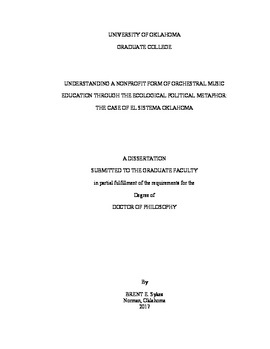| dc.description.abstract | This is an educational studies dissertation substantiated in an emergent, empirical case. Over the past few decades, the fine arts, including music education, have increasingly been de-emphasized in PK-12 school environments. In this case, I examine the existence of El Sistema Oklahoma (ESO), a community-focused nonprofit organization with the mission of “transforming lives through music.” ESO is one of about 130 El Sistema–inspired affiliates operating in the United States. To date, existing research on El Sistema has largely been focused on pedagogy and music theory, not policy matters. At the time of this research, ESO had completed its third year of operations. It serves approximately 220 students in Oklahoma City Public Schools (OKCPS), the largest and most diverse school district in the state
This is an instrumental case study intended to shed light on how actors and institutions in a given community address the defunding of music education. In this particular case, founders had strong personal relationships with individuals representing two anchor institutions, Oklahoma City University (OCU) and St. Luke’s United Methodist Church, both of which have experience in after-school programming and in supporting the arts. Stakeholders did not have strong ties to the third anchor institution represented in the case, Trinity International Baptist Church. It was selected for two reasons: its size and its geographic location.
I provide a thick description of the environment in which the case operates, paying particular attention to the sociopolitical forces in the local community, including the issue of school choice, the lived experience of the founders, OCU, OKCPS, and the role of the Oklahoma City Public School Foundation. My engagement with the case spanned six months. During that time, I employed multiple methods to gain a robust understanding of the case. Sources of data include interviews, documents, artifacts, ethnographic fieldwork (participant and direct observations), and memoing.
Two theoretical lenses guide this inquiry. First, the ecological-political metaphor (EPM) allows me to analyze the case in terms of policy formation in the local community. I treat stakeholders’ investment (or de-investment) of resources and capital as “playing the game” of orchestral music education. Through the qualitative method of constant comparison, eight themes emerged through the EPM.
The second theoretical lens focuses on whose social need is being addressed through the ESO. I draw upon the typology of Kettner, Moroney, and Martin (2008) to respond to this question. They contend that there are four types of need: perceived, expressed, relative, and normative. I examine qualitative data sources, school site characteristics, mobility rates, and the evolution of ESO services to determine what form of need is addressed. I determine that ESO places value on the social and cultural capital of parents/guardian, which enables increased political mobilization of educational matters related to their children. I then consider how this relates to the Deweyan notion of a public.
Given the current sociopolitical environment that is defunding longstanding social services, this case study is timely. It is plausible that we, as a society, may come to rely more upon philanthropy and the nonprofit sector to address gaps in social and educational services. This case demonstrates how founders and stakeholders galvanized the local community around the need for increased educational opportunities, such as orchestral music, for children in a high-poverty area. ESO has received far-ranging endorsements from the nonprofit and music education community and is in the process of becoming self-sustainable through grants. | en_US |
